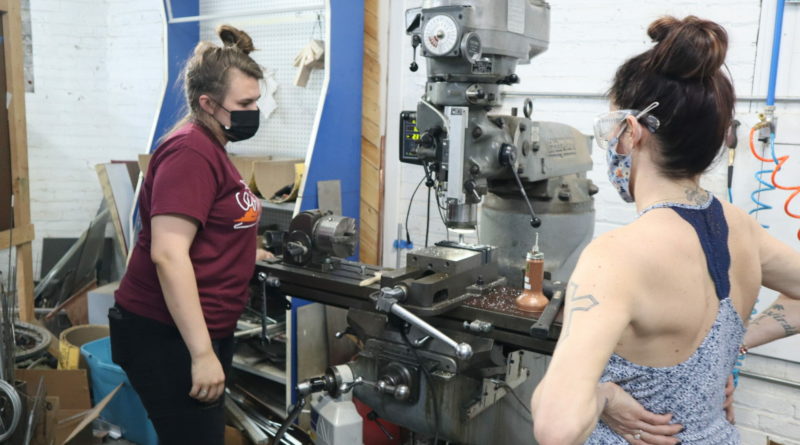Women in Machining Program
BWXT and the National Association of Manufacturing have set goals to increase the number of women in manufacturing jobs. The Women in Maching Program. Shanyn Hernandez was working in sales when she saw a social media post about a free 12-week Women in Machining course at her local maker’s space, Vector Space.
Learning how to “make something out of nothing” changed the course of her life.
“I’ve been working since I was 15 but I didn’t really have a career,” Hernandez said, explaining that she’s now working toward a Machine Tool Diploma at Central Virginia Community College and a career in machining.
The Women in Machining program is truly life-changing, said Elise Spontarelli, who runs Vector Space, and the program, with her husband Adam. The Spontarellis call their maker space, which opened in 2015, “a traditional hacker club” with “intentional education programs.”
Three years ago Vector Space began offering Women in Machining, teaching small groups of women the basics of mill and lathe work. Through partnerships with the City of Lynchburg Office of Economic Development and Tourism’s HireLynchburg; Non-Traditional Occupations for Women (N.O.W.); and nearly a dozen other nonprofits and companies such as BWXT, Belvac and Automated Conveyor Systems, the program has already trained 14 women to go into the machine trades.
Partnerships
Partnerships with The Jubilee Family Development Center, Miriam’s house and the YWCA help identify women who are a good fit for the program. Participants must also meet certain income requirements and qualify for Temporary Assistance for Needy Families.
Although most employers now work in the realm of CNC machining — where computers control the machines — they want employees who have a foundation in manual machining. Women in Machining teaches women how machines work.
Two former students are now working in the field; four are applying for machining jobs; one, Hernandez, is enrolled at CVCC; and two more are in the process of determining their next best steps.
“Working with machines is not an area that women are often attracted to,” BWXT’s Nat Marshall said. As a government contractor, the company is required to work toward making its demographics mirror those of the community.
“At BWXT we are always striving to increase our diversity,” and increase the number of qualified candidates available, Marshall, BWXT’s Equal Employment Opportunity and Community Relations Manager said.
Right now just 14% of BWXTs machinists are female.
Nationwide, women make up about 30% of the manufacturing workforce.
National Association of Manufacturers
David O’Brien, National Association of Manufacturers, Vice President, Strategic Communications said a Manufacturing Institute (NAM’s 501c3 workforce and education partner) aims to increase that percentage to 35% by 2030.
The Women in Machining program lays the foundation for companies to get more women into their machine and inspection shops.
“This machining program starts out by just making it exciting and interesting. The first project is jewelry, something that is fairly simple and allows them to have some successes. [They] then grow their knowledge and understanding of working on the machines until they actually produce something that is of substance,” Marshall said.
“Being a machinist can be a scary thing … at BWXT machining on a product that’s [worth] $10 million could be something overwhelming,” he said. This program shows women they can be successful machinists and progress into jobs that can pay $40 an hour.
To make that message stick, BWXT regularly sends female machinists and engineers to WIM classes to talk about their life and their experiences and how they got to where they are.
BWXT’s Teresa Price is one of them.
When she joined BWXT in 2016, she was one of just five female machinists, out of 150. Today she is a front line manager for a quality control group.
“It really provides you with a good quality of living and a satisfying life,” said Price, who wants women to be afforded the same career opportunities as men.
Misconception of Women in Machining Program
Women who don’t know about the machine trades have a misconception that they are dirty jobs. That’s not true, she said, and the class really opens women’s eyes to the opportunity there while also knocking down the stereotypes.
“I enjoy it because I like seeing the final project. It makes you feel proud of yourself,” Price said.
For those who enjoy working with their hands and have a mechanical mindset, she recommends women consider the field.
Success stories like Prices combined with the energy and knowledge of the Spontarellis are helping the program blossom.
Hernandez praises Elise Spontarelli for the support and inspiration she provides students.
“It sets you up for a better path for life,” Hernandez said, noting that Elise not only took the time to find out what she needed in life but helped her enroll at CVCC.
“They are just very encouraging. I think they are very excited for you to start” your career, she said.
What Vector Space does, works because the Spontarellis teach others only what they personally know.
“We’re really conscious about being a partner in a way that is healthy and adds to the ecosystem and doesn’t try to pull students from somewhere else,” she said.
SkillsUSA Curriculum
This year for the first time, thanks to a partnership with Virginia Career Works, WIM included the SkillsUSA curriculum. Each week students spent two days working on machines and another two on the SkillsUSA curriculum, which teaches skills like workplace etiquette and how to interview.
Spontarelli said the first two classes taught her that just teaching the women the trade was not enough, they also needed soft skills so they could be ready to apply for jobs and apprenticeships. She hopes the added lessons will speed up the job placement process, which in the past took about nine months.
Vector continues to meet with employers and participants after the course to find out what might be missing. One result is students now get more time to practice reading blueprints and drawings.
“Something else that is important to us is the relationship that we’re building with the employers,” Spontarelli said. “It’s important to us that we’re not just throwing these women out into a field that is 96 to 98% male without preparing them, and then also without making sure that the employer is looking for this type of culture and this type of potential change in their machine shop floor.”
Personally Vetted
Only companies that her team has personally vetted. That means tours, interviews and more. Interview students that have completed the Women in Machining Program.
“What we hear from a lot of [employers] is that … they’re all trying to build a culture of employee retention and they want to be a working space where people feel comfortable and they can support their families “ Spontarellli said.
Vector Space’s self-awareness, attention to detail and professionalism helps motivate companies like BWXT to invest in its programs, Marshall said.
“Elise and Adam, they understand their lane and they’re very good in their lane. Sometimes there are groups that will step out of their lanes. Or not be aware of other organizations doing the very same thing.”
“Elise and Adam, they’re just so intelligent. They have an in-depth knowledge of every piece of equipment. And are so free to give that information to anyone who comes in,” he said.
The Spontarellis said they plan to keep the classes small. They also could replicate their model with other skills like welding or industrial textiles work.
“It’s a big lift as a program. I mean, I am emotionally invested in all of these women and their futures and I get to know them. And it’s amazing to see. Sometimes it feels like we can’t do enough [but] I guess we’re trying and we’re doing and it’s so much work,” she said. “If you don’t have those success stories, they can just feel really hard. To get a text. Or when someone will just drop into the space and touch base to tell us how they’re doing. Even if it’s one participant per year, whose life we changed, that’s it. That’s amazing. That’s why we do this,” Spontarelli said.
https://www.techedmagazine.com/category/news/manufacturing/


